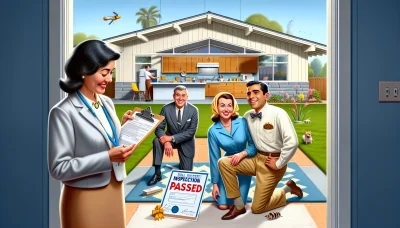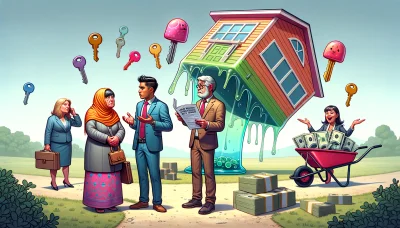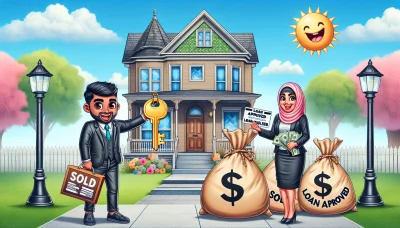Comparing renting vs. buying Quiz
Test Your Knowledge
Question of
Understanding Renting vs. Buying
Initial Costs Comparison
Get ready to dive into the financial nitty-gritty of initial costs! When you're comparing renting and buying, the upfront expenses are a GAME CHANGER. Let's talk about your first major hurdle: the down payment for buying a home versus the security deposit for renting. A down payment is typically a substantial percentage of the home's purchase price, which means you need to have some serious cash saved up. On the flip side, a security deposit might only be a month or two of rentway less intimidating for your wallet!
But wait, there's more! Closing costs are like the hidden track on your favorite albumyou don't see them coming, but they're part of the deal when buying a home. These can include a variety of fees and can add up to thousands of dollars. Renters, you're not off the hookyou'll likely have to cough up not just the first month's rent, but often the last month's too, plus possibly a broker's fee.
Moving and setup expenses? Absolutely! Whether you're renting or buying, you've got to factor in the cost of actually moving your stuff and setting up your new place. Think moving trucks, packing supplies, maybe even new furniture.
- Down Payment: A hefty initial investment when buying.
- Security Deposit: A smaller amount that renters need to secure their lease.
- Closing Costs: Additional fees buyers face that can total a significant sum.
- First Month's Rent: Just one part of the upfront cost for renters.
- Moving and Setup Expenses: Costs both renters and buyers encounter when transitioning to their new abode.
Long-Term Financial Implications
This is where things get really juicy! Long-term financial implications are like seeds you plant todaysome will grow into mighty oaks (equity!), while others might just stay tiny acorns (rent receipts). Homeowners rejoice as each mortgage payment increases their equity build-up over time; it's like forcing yourself to save money that you can later tap into. It's an incredible feeling knowing that with every payment, you own a little bit more of your home!
Renters, on the other hand, may face rent increases year after yearouch! But homeowners with fixed mortgage payments can sit back and relax knowing their monthly payments won't skyrocket out of nowhere. And let's not forget about tax deductions and benefits; homeowners often get to deduct mortgage interest and property taxes on their income taxes. Thats righta potential annual bonus courtesy of your commitment to owning!
The bottom line? The long-term financial implications of renting versus buying can significantly impact your future wealth. Equity build-up is like planting an orchardit takes time but eventually bears fruit. Fixed mortgage payments provide stability against inflationary pressures on rent. And those tax deductions? They're like cherries on topsweetening the deal for homeowners every April!
Flexibility and Commitment
The Flexibility of Renting
Are you craving the freedom to explore, move around, and live without the heavy anchor of a mortgage? Renting might just be your ticket to a liberating lifestyle! With renting, you're not tied down. You have the power to choose from a variety of lease duration options . Whether it's short-term leases or long-term ones, you're in control. This flexibility is a game-changer for those who are always on the move or simply testing the waters in new cities.
Let's talk about relocation ease . Renters have the phenomenal advantage of being able to pack up and move with relative ease. No need to worry about selling a property before you can jet off to your next adventure! Plus, when it comes to maintenance, renters hit the jackpot. Say goodbye to the hassle of repairs and upkeep because that's usually in the landlord's court. Less responsibility for maintenance means more freedom and less stress for you!
The Stability of Homeownership
Now, for those who dream of planting roots and crafting their own personal sanctuary, homeownership offers unparalleled stability. Imagine having long-term residence security a place that is truly yours for as long as you desire. Buying a home is not just an investment in real estate; it's an investment in your future. It's about creating lasting memories in a space that grows with you over time.
Customization and personalization freedom are where homeownership really shines! Want to paint your walls? Go ahead! Dreaming of a backyard oasis? Make it happen! Your home is your canvas. And let's not forget the incredible sense of community and belonging that comes with owning your home. Neighbors become friends, streets become familiar, and your house becomes an integral part of who you are.
- Lease Duration Options: Choose how long you stay!
- Relocation Ease: Move freely without the burden of selling!
- Less Responsibility for Maintenance: Enjoy more time living your life!
- Long-Term Residence Security: Settle down with confidence!
- Customization Freedom: Turn your house into a dream home!
- Sense of Community: Build lasting relationships!
Investment Potential and Value Growth
Real Estate as an Investment
Imagine the possibilities when you dive into the world of real estate investment! It's a realm brimming with potential for savvy investors. Real estate stands as a cornerstone of wealth building, offering a tangible asset that historically appreciates over time. Unlike stocks or bonds, real estate is a physical commodity that can provide both utility and financial returns.
When you invest in property, you're not just buying land or buildings; you're securing a piece of the future. With the right location and market conditions, your investment can grow exponentially. It's about playing the long game investing today for a more prosperous tomorrow. And remember, real estate markets have shown resilience over time, bouncing back even after downturns, which means your investment has the potential to weather economic storms!
The beauty of real estate lies in its versatility. Not only does it serve as a place to live or conduct business, but it also holds the power to generate passive income through leasing or renting out. This dual-purpose nature makes it an exceptional choice for those looking to diversify their investment portfolio and secure their financial future.
Appreciation Potential
Get ready for this: Real estate appreciation is like watching your favorite plant grow given time and the right conditions, it can flourish beyond expectations! As communities develop and populations increase, the demand for property tends to rise, pushing up the value of your investment. This isn't just speculation; it's a trend backed by historical data showing consistent growth in property values over time.
Appreciation isn't just about waiting passively for your property's value to increase it's an active investment strategy. By improving your property through renovations or upgrades, you can significantly boost its market value. This proactive approach to increasing equity is what sets apart astute investors from the rest.
Leveraging Property to Build Wealth
This is where things get exciting! Leveraging property means using borrowed capital for your real estate investments, amplifying your potential returns. With real estate acting as collateral, lenders often feel more comfortable offering financing. This leverage can be a powerful tool in multiplying your wealth-building capabilities.
The concept is simple yet profound: use other people's money to increase your own wealth! By taking out a mortgage with a low-interest rate, you invest less of your own capital while still reaping the full benefits of property appreciation and rental income. It's like having your cake and eating it too!
Passive Income Opportunities through Renting Out
- Rental Revenue: Imagine earning money while you sleep! That's what rental properties offer a steady stream of passive income that can cover mortgage payments and result in profit.
- Tax Advantages: The tax code favors real estate investors! Deductions on mortgage interest, operating expenses, and depreciation can significantly reduce tax liability.
- Inflation Hedge: Rental income tends to keep pace with inflation, meaning as prices rise generally, so can rent protecting your purchasing power.
Renting with No Equity Growth
Let's shift gears and talk about renting it's like being on a treadmill where you're putting in effort but not actually moving forward financially. When you pay rent, that money goes straight into someone else's pocket there's no return on investment for you. Each rent check is an expense without any lasting benefit; once spent, it's gone forever.
Renters face another stark reality: they have no equity growth. Unlike homeowners who build equity with each mortgage payment, renters don't see any increase in personal wealth from their monthly rent payments. It's important to understand this dynamic when considering housing options renting offers flexibility but not financial growth.
Money Spent on Rent Is Not Recoverable
This point cannot be overstated: when you pay rent, that money is not coming back to you ever. It doesn't contribute towards owning an asset or building net worth; it simply covers temporary shelter without any long-term financial benefits.
Lack of Control Over Investment Value
Renters often overlook this critical drawback: they have zero control over their housing investment value because there isn't one! While homeowners can influence their homes worth through improvements and market timing, renters remain at the mercy of their landlords' decisions and market fluctuations.
No Asset to Leverage for Other Investments
Last but certainly not least: renters miss out on leveraging opportunities that come with owning an asset like real estate. Homeowners can tap into their home equity for loans or lines of credit to invest in additional properties or other ventures options that simply aren't available to renters.
Monthly Expenditures and Budgeting
Renting Expenses Breakdown
Are you considering renting? Let's dive into what that entails financially! Renting is often seen as the hassle-free option, but it comes with its own set of expenses. Monthly rent payments are just the tip of the iceberg. They're predictable, yes, but they can also fluctuate depending on your lease terms and market conditions. You've got to stay alert to these changes!
Beyond rent, there are utility costs , which can include electricity, water, gas, and internet. These vary based on usage and service providers, so it's crucial to budget for them smartly. And don't forget about renter's insurance ! It's a small price to pay for a huge peace of mind protecting your personal belongings from theft or damage is a no-brainer!
Maintenance and repairs? Generally, they're not your headache as a tenant. But be aware: if damages exceed normal wear and tear, you could be on the hook. Its essential to understand your lease agreement inside out to avoid any unexpected costs.
Homeownership Costs Analysis
Moving onto homeownership it's a big step with big financial implications! The cornerstone of homeownership costs is the mortgage payment structure . Unlike rent, this usually includes both interest and principal repayment building equity in your home with every payment! But remember, mortgage rates can vary dramatically, so getting the best deal is key to managing long-term costs.
But wait, there's more! As a homeowner, you'll also need to budget for homeowner's insurance and property taxes . These can be hefty and often increase over time. They're non-negotiable and vital for protecting your investment.
Lastly, let's talk about upkeep and renovation costs. Owning a home means you're responsible for all maintenance from the roof down to the foundation. And renovations? They can boost your home's value but require upfront investment. Always have a contingency fund ready for those unexpected repairs that pop up!
- Mortgage Payments Structure: Principal + Interest
- Homeowner's Insurance: Protect Your Investment
- Property Taxes: A Recurring Expense
- Upkeep: From Minor Repairs to Major Overhauls
- Renovation Costs: Plan and Budget for Improvements
In conclusion, whether you choose to rent or buy, understanding and managing these expenses is critical. Make an informed decision that aligns with your financial goals and lifestyle preferences its a choice that will shape your future!
Risk Management and Contingency Planning
Risks Associated with Renting
Lease Termination and Eviction Concerns
Attention, renters! It's crucial to understand that your tenure in a rental property could be as volatile as the stock market! Lease termination can come knocking at your door with little notice, leaving you scrambling for a new place to call home. This is not just a minor inconvenience; it's a MAJOR disruption that could happen due to various reasons such as property sale, renovation plans by the landlord, or even eviction if terms of the lease are breached. Always have an emergency plan in place because this is real-life folks not just a hypothetical scenario!
Eviction concerns are especially pertinent for those who might face financial hurdles. Missed rent payments can lead to eviction notices faster than you can say "lease agreement"! It's imperative to stay ahead of the game by budgeting carefully and understanding your rights as a tenant. Remember, knowledge is power, and staying informed about your lease terms can make all the difference in maintaining your housing security.
And let's not forget the emotional toll it can take! Being forced to move out unexpectedly can be incredibly stressful. It's essential to always read the fine print of your lease agreement and know where you stand legally. Keep those lines of communication with your landlord open and transparent to mitigate potential risks!
Rent Fluctuation and Market Instability
Hold onto your hats because we're diving into the rollercoaster world of rent fluctuation and market instability! Renters face the undeniable reality that their monthly expenses could skyrocket without warning due to market trends or landlord discretion. This isn't just about budgeting; it's about financial survival in an unpredictable economic climate!
Market instability means that what was once affordable can become a financial burden overnight. As demand for housing increases, so too might your rent often at rates that wage increases simply cannot keep up with. This is why savvy renters must always be prepared for potential hikes by saving diligently and exploring rent stabilization options if available.
- Always inquire about rent increase caps before signing a lease.
- Research local housing laws that may protect you from excessive rent hikes.
- Consider longer lease terms to lock in current rates.
Remember, being proactive about understanding market trends can give you the upper hand in managing your finances effectively. Don't let rent fluctuations catch you off guard stay informed and ready to act!
Limited Control Over Living Space and Rules
Tenants, listen up! When renting, you sign away some degree of freedom regarding how you live in and use your space. Want to paint the walls? Check with the landlord first. Dreaming of adopting a furry friend? Better review that pet policy again! Your living space isn't truly yours in the sense that you must adhere to rules that may not align with your lifestyle preferences.
This limited control extends beyond aesthetics; it includes substantial lifestyle implications as well. Noise restrictions, guest policies, and renovation limitations are just a few examples of how renters must mold their lives around predetermined rules. While these constraints might seem minor on paper, they can significantly impact day-to-day living satisfaction.
It's vital to thoroughly review all rules before moving into a rental property. Understanding these limitations upfront will help prevent conflicts down the road and ensure that your rented home feels as comfortable as possible within the given parameters!
Risks of Buying a Home
Market Risks and Property Depreciation
Potential homeowners, brace yourselves for the truth bomb: buying a home isn't just about picking out curtains and hosting housewarming parties; it comes with real financial risks! Market volatility can lead to property depreciation yes, that means your investment could shrink in value over time instead of growing!
The real estate market is like a living entity constantly evolving and sometimes unpredictable. Economic downturns or local industry collapses can result in lower property values, which might leave you owing more on your mortgage than what your home is worth. This situation is known as being "underwater," and it's as scary as it sounds!
To combat these risks, thorough market research before purchasing is non-negotiable! Understand local economic indicators, future development plans in the area, and historical property value trends. Knowledge is not only power here; it's also financial protection!
Unexpected Major Repairs and Maintenance Issues
Buckle up for some real talk: owning a home means being on the hook for all repairs and maintenance including those unexpected major issues that hit both your home and wallet hard! We're talking about burst pipes, roof damage from storms, or ancient HVAC systems finally giving up the ghost.
A proactive approach is key here regular inspections and maintenance can prevent some disasters but always have an emergency fund because when it rains (sometimes literally), it pours (financial obligations). The cost of significant repairs can easily climb into tens of thousands of dollars no small change by any measure!
And remember: insurance helps but doesn't cover everything. Make sure you understand what your policy includes and consider additional coverage for peace of mind. Owning a home means being prepared for anything especially when it comes to protecting your investment from unexpected repair costs.
Challenges in Selling or Renting Out the Property
Selling or renting out property isn't always a walk in the park; sometimes it's more like an obstacle course fraught with challenges! From finding qualified buyers or tenants to navigating complex legal requirements this process demands time, effort, and often money.
The real estate market doesn't always cooperate with your timeline either. You may need to sell quickly due to job relocation or personal circumstances but find yourself stuck waiting for months (or even years!) for the right offer to come along. And if you're looking at renting out your place instead? Brace yourself for potential tenant issues such as late payments or property damage.
To mitigate these risks: do comprehensive market analysis before listing, price competitively based on current conditions, stage your home attractively for showings, vet tenants thoroughly if renting out, and most importantly have patience! The right buyer or tenant will come along; ensure you're ready when they do!
Lifestyle Considerations and Personal Preferences
When it comes to choosing between renting and buying, lifestyle considerations and personal preferences play a pivotal role. It's not just about crunching numbers; it's about how you want to live your life! Everyone's situation is unique, and what works for one person might not be the best choice for another. Let's dive into the factors that could sway your decision!
The Convenience Factor of Renting
Renting can be a game-changer for those who crave convenience and flexibility! Imagine living in a place where maintenance headaches are someone else's problem. That's right, when you rent, you call the landlord, and voila issues get fixed without you lifting a finger. Plus, rental agreements often come with shorter commitment periods, giving you the freedom to move on when life calls for a change.
But wait, there's more:
- Amenities and Services Included in Renting: Many rental properties offer incredible amenities like gyms, pools, and community spaces all included in your rent. It's like having a mini-resort at your doorstep!
- Proximity to Work and Urban Centers: Renters often have the upper hand in snagging spots close to bustling urban centers or workplaces. This means less commute time and more playtime!
- Community Features and Social Opportunities: Apartment complexes and rental communities are hotspots for social interaction. Meet neighbors at community events or bond over shared facilities renting can be socially rewarding!
The Pride of Homeownership
Ah, homeownership the quintessential American dream! There's an undeniable pride that comes with owning your slice of the earth. It's not just a house; it's a home where memories are made, where kids grow up, where you have the final say on decor. And let's not forget about building equity every mortgage payment is a step toward owning an asset outright.
Homeownership isn't just about financial gains; it offers lifestyle perks too:
- Building a Family Home and Legacy: Buying a home means putting down roots. You're creating a family hub that could be passed down through generations now thats legacy-building!
- Privacy and Independence Advantages: Say goodbye to shared walls! Owning your home means more privacy and the freedom to live life on your terms.
- Gardening, Pets, and Outdoor Space Possibilities: Green thumbs rejoice! With homeownership comes the potential for gardens, pet-friendly yards, and personal outdoor spaces. Transform your backyard into an oasis or a playground its all up to you!
Future Planning and Exit Strategies
Endgame for Renters
Are you renting and feeling like you're on a treadmill, going nowhere fast? It's time to focus on the future! Let's talk about the endgame for renters. You've got options, and it's crucial to strategize for what's ahead. Whether you're saving diligently for a down payment or eyeing the leap into homeownership, your journey doesn't end at your current lease. Consider this: every rent payment can be a stepping stone towards your own property!
But wait, there's more! Renting offers flexibility that buying simply can't match. You're not tied down; you can move with ease to chase career opportunities or just for a change of scenery. And remember, while you're renting, you're also avoiding the maintenance costs and property taxes that come with homeownership. That's right renting can be a strategic move in your overall financial game plan!
Now, let's not forget about credit scores! Maintaining a good rental history can boost your credit score, making you an attractive candidate when the time comes to apply for a mortgage. So keep paying that rent on time it's building more than just a roof over your head!
Saving While Renting for Future Purchases
Picture this: You're building a war chest for your future home purchase , even while you rent! Yes, it's possible to save while renting, and it all starts with budgeting like a pro. Cut unnecessary expenses and watch your savings grow. And don't overlook high-yield savings accounts or investment options that can accelerate your progress toward homeownership.
Catch this: Some employers offer down payment assistance programs as part of their benefits package. Look into it! This could be the turbo-boost your savings need to propel you from tenant to homeowner status.
And here's an insider tip: automate your savings! Set up automatic transfers to a dedicated savings account each payday. It's like paying yourself first because future-you deserves that dream home!
Transitioning from Renter to Buyer
The transition from renter to buyer is like stepping into a whole new world of possibilities! It's exciting but also requires careful planning and preparation. Start by educating yourself on the home-buying process knowledge is power, after all!
Get this: You'll want to get pre-approved for a mortgage before house hunting. This gives you clarity on what you can afford and shows sellers that you mean business. And when it comes time to make an offer? Negotiation skills are key so sharpen them up!
Dive deep into the market trends, understand property values in your desired area, and don't rush into anything. The perfect home is out there waiting for you ensure you're ready to seize the opportunity when it presents itself!
Subletting and Lease Transfer Options
- If life throws a curveball and you need to move before your lease is up, subletting could be your golden ticket.
- Dig into your lease agreement; some landlords are flexible with subleasing arrangements.
- A lease transfer might be another avenue passing the baton to another tenant can free you up without breaking any rules.
Selling and Moving On from Homeownership
Selling your home? It's not just about sticking a "For Sale" sign in the yard; it's about understanding the market dynamics and timing your exit perfectly. But don't sweat it with the right strategy, selling can be as rewarding as buying was.
You've built equity over time, and now its time to reap those rewards! Think of selling as graduation day you've outgrown your current place and are moving onto bigger things (or maybe smaller if downsizing is in the cards). This is where smart decision-making pays off big time!
Hear this out: A well-staged home can sell faster and at a higher price point. First impressions matter, so make yours count! And always keep an eye on housing market trends; timing is everything when cashing in on your investment.
Capital Gains Considerations When Selling a Home
Bingo! You've sold your house for more than you bought it that's capital gains for you! But hold on; Uncle Sam might want a piece of that pie. Familiarize yourself with capital gains tax laws because they will affect how much money ends up in your pocket.
If it was your primary residence for at least two of the last five years, you might qualify for an exclusion. That means keeping more of those gains tax-free! Consult with a tax professional they'll help navigate these waters so that you maximize profits from the sale.
Tax implications can be complex, but don't let them intimidate you. With proper planning and expert advice, selling your home can be financially advantageous!
Renting Out the Home as an Income Source
Renting out your home? Thats turning real estate into real income! Its not just about collecting rent checks; its about creating financial stability through passive income streams.
Becoming a landlord comes with responsibilities but also significant potential rewards. Ensure you understand landlord-tenant laws in your area and screen tenants carefully good tenants are worth their weight in gold.
Maintain that property well because well-cared-for homes attract better tenants and command higher rents. Remember, this isnt just an income source; its an investment in your financial future!
Downsizing or Upgrading Scenarios
Lifestyle changes often lead us to reconsider our living spaces. Whether downsizing due to empty nest syndrome or upgrading because of expanding family needs or increased income, these transitions are pivotal moments in life.
Analyze market conditions closely because they'll dictate whether its a buyers or sellers market crucial info when plotting out your next move.
Last but not least, consider how changes in housing needs align with long-term financial goals. Downsizing might free up cash flow whereas upgrading may increase asset value over time - choose wisely based on what stage of life youre entering next!












